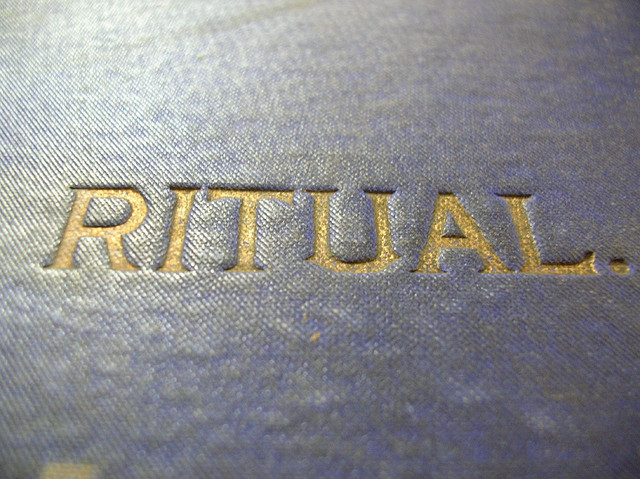TW Column by Emily Toth
Whatever It Takes to Get to the End

I have faith that I’ll finish writing this sentence. And this paragraph.
Woot! I did it!
I’m writing this by hand, in cursive, in a decrepit old notebook—all rituals of faith. If I do things just right, the terror of the empty page won’t rise up and engulf me, and I won’t hear my psyche screaming, “You think you’re a writer? You are such a fucking fraud!”
I’ve been hearing that snarly little voice all my life (well, not the “fucking” until recently, when editors would finally print the word). Yet, I can’t not write. I suppose baseball players have a similar compulsion when they’re at bat. They know they’ll fail 60 or 70 percent of the time and publicly. They think they’ll increase their odds with special rituals, such as crossing themselves or whispering sweet nothings to the bat. Or not changing their underwear while they’re on a hitting streak.
Writers have rituals, too. Balzac wore his monk’s cassock; Dame Edith Sitwell lay down in an open coffin. Schiller inhaled the odor of rotten apples, and D. H. Lawrence ran up and down mulberry trees, naked. I used to have a special writing costume, a purple velour bathrobe, but it disappeared after a house move. Maybe some internationally famous author has found inspiration in its folds. Maybe I’ve missed out on a Pulitzer.
We writers trust what we must, because we’re always afraid the well will dry up. I’m okay now—in the middle of writing this—but it took me a week to work up to writing the first sentence. The perfect ending isn’t apt to come to me until a day or two after I finish my first draft, if it comes at all. Sometimes, it doesn’t.
I’ve heard that some people write out of joyous exuberance—but nobody I know. We love having written, and many people (I’m one) love the editing and reshaping process. But the first draft is a leap of faith, a free fall into failure. A plunge into an abyss of imposter syndrome. An icy void.
Sometimes, I fancy that if I follow the right rules, I’ll write facilely, freely, flowingly, with unflagging faith in my own gifts. No more angst and no more qualms. Of course, I’ve had the delusion that rules will save me since the time I wrote my first novel. I was nine years old.
Some writing rules are so common they’ve become mantras. A big one is Apply seat to chair (often attributed to Stephen King). Another is Write every day (attributed to everyone). Another is Don’t answer the damn phone when you’re writing.
(And if you do answer the damn phone, don’t be rude to whatever hapless soul has called you. One of my students—“Valerie”—was invited to call a famous writer for an interview. When she did, the writer railed at her: “You called when I was in the shower. How could you!?” Valerie never wants to talk to a writer again.
So, another rule: Don’t scare the paying customers.)
But I’m just stewing and spewing, producing a “shitty first draft” (Anne Lamott). I'm trying not to hear that hissing little mental voice saying, You need to organize and This stuff is dull, dull, dull.
It’s hard to make good rules for writing while I’m whining.
I’d like to follow yet another hallowed rule—no adverbs—but obviously I’ve violated it in this sentence. Nothing conveys tentativeness, or dweeby wussiness, better than a weasely adverb. When I must weasel, I must have adverbs.
I do have faith in my ability to be humorous, something many writers can’t do. I don’t think it can be taught. An innate appreciation for sound is essential, for instance. Author Annie Dillard’s mother showed it when she heard a radio baseball announcer say, “Terwilliger bunts one!”
At the time, Wayne Terwilliger was a utility infielder for the New York Giants; Dillard’s mother was something of a “card,” according to her daughter. Soon Dillard’s mother was heard wandering about the house, murmuring, “Terwilliger bunts one. Is that English?” Thereafter, any time she was called on to say anything about anything, Dillard’s mother would intone, “Terwilliger bunts one.”
Terwilliger’s autobiography is even called Terwilliger Bunts One. He knew good writing.
Writers are always educating someone.
But even great writers—even Shakespeare—sometimes tumble into “fourth-act sag.” It’s the moment, seventy or eighty percent into a play or article or movie, when the energy fizzles. Audiences start coughing or twitching; readers pull out their phones and check their messages.
This is the time when writers have to take a leap of faith and up the stakes. The huge monkey kidnaps the screaming blonde ingénue. The dinghy sinks, and everyone seems to have drowned. There’s no more food in the cellar, and the survivors start looking hungrily at each other. There are plagues. Someone prays. Someone laughs. Someone gives advice.
Terwilliger bunts one.
I do wish more writers would do the fake-portentous mode, which I’ve borrowed from Miss Manners for my “Ms. Mentor” academic advice column in the online Chronicle of Higher Education. Ms. Mentor, like Miss Manners, promulgates impeccable and grandiose pronouncements about the peccadilloes and peacockings of academe. Unlike pale academic proseurs, Ms. Mentor has strong opinions. She “lauds.” She “disdains.” She “loathes.”
She also has a stash of unused “heavy-handed proverbs,” a contest once run in New York magazine. Ms. Mentor and I have never forgotten this 1971 winning entry from Linda H. Heinze: “In the house of a hangman, extinguished candles shed no light.”
Another entrant who received an honorable mention, John R. Christiansen, produced a proverb I’ll now use as the perfect ending to my poor-me column. If I can’t write, I can at least quote—with attribution—Christiansen’s wise take on it all:
I used to feel sorry for myself because I had no shoes until I met a man who was dead.
 Publishing Information
Publishing Information
- “O Muse! You Do Make Things Difficult!” by Diane Ackerman, New York Times, November 12, 1989.
- On Writing: A Memoir of the Craft by Stephen King (Scribner, 2000).
- Bird by Bird: Some Instructions on Writing by Anne Lamott (Pantheon Books, 1994).
- An American Childhood by Annie Dillard (Harper & Row, 1987).
- Terwilliger Bunts One by Wayne Terwilliger with Nancy Peterson and Peter Boehm (Globe Pequot, 2006).
- “Results of Competition Ninety-Eight” (for “heavy-handed proverbs”), New York, December 13, 1971.
Art Information
- "Spell/Charm Bag for NaNoWriMo" © Sasha Kelley; Creative Commons license.
- "Ritual" © Crystal; Creative Commons license.
 Emily Toth is a regular columnist for Talking Writing. Her eleven published books include biographies (Kate Chopin and Grace Metalious), academic advice books (Ms. Mentor), and one historical novel (Daughters of New Orleans). She writes the “Ms. Mentor” online advice column for the Chronicle of Higher Education and is writing a novel called A Dirty Book in Louisiana.
Emily Toth is a regular columnist for Talking Writing. Her eleven published books include biographies (Kate Chopin and Grace Metalious), academic advice books (Ms. Mentor), and one historical novel (Daughters of New Orleans). She writes the “Ms. Mentor” online advice column for the Chronicle of Higher Education and is writing a novel called A Dirty Book in Louisiana.
